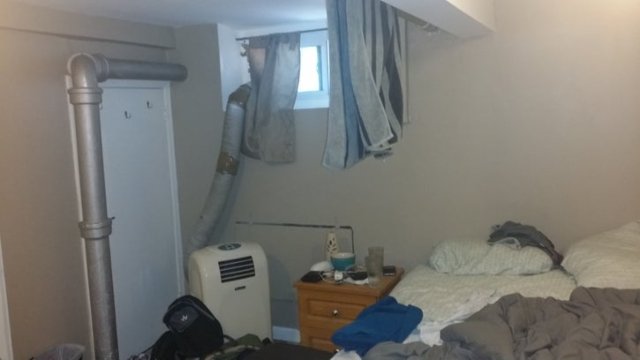City Sues Over Alleged Airbnb Housing Ring That Made Millions
June 20, 2019, 1:39 p.m.
A complaint alleges that 13 people and entities misled guests into illegal, unsafe short-term rentals.

Inside one of the units allegedly turned into a constant short-term rental for tourists.
A ring of illegal hoteliers is facing a lawsuit from the city for allegedly using Airbnb and other "home sharing" websites to turn dozens of NYC apartments into short term rentals for tourists.
On Wednesday, the Mayor's Office of Special Enforcement [OSE] filed a lawsuit against 13 people and entities for allegedly participating in a housing scheme that converted 36 buildings into illicit hotels using Airbnb, Booking.com, and Homeaway.com. The complaint named Elvis Tominovic (a licensed realtor with Progressive Realty Group), his father Franko Tominovic, and his mother Loreta Tominovic, of Astoria, Queens, as defendants in the case. Other members of their family and friends, including Susana and Sanya Colic, Dragan Mavra, Neo Panayiotou, and Elvis's sister, Romina, were also allegedly involved in the plot, according to the complaint.
Since at least 2015, the defendants in question "collaborated and conspired with each other, as well as with other unnamed defendants, in a wide-ranging operation to profit from illegal short-term rentals that have converted dozens of permanent residential dwelling units into de facto hotels, and misled thousands of transient guests into booking such unlawful and unsafe accommodations" while netting over $5 million in profits, according to the complaint submitted to the Queens County Supreme Court.
The investigation, which was initiated following a tip from a concerned neighbor, found that the defendants allegedly advertised units in Manhattan, Queens, and the Bronx, renting out rooms in dozens of buildings, some of them rent-stabilized, to almost 60,000 guests over five years—while not alerting them that where they were staying was both illegal and unsafe.
Investigators believe the defendants used several shared bank accounts to collect travelers' money, as well as shared phone numbers and IP addresses, to create host accounts on multiple websites. All told, the ring allegedly rented units to almost 60,000 guests over five years.
A three-story building located at 25-58 48th Street, for instance, was advertised as “Big Wonderful NYC Apt in Astoria” for $130 a night. And another, going for $90 a night, boasted: “Big Gorgeous Room for Rent with 2 Closets Astoria," the complaint details. The Queens neighborhood has become a particular epicenter of illegal renting schemes, and, as a 2018 report from the Comptroller's Office posited, home sharing websites have contributed to rising rents in NYC, by taking potential residential apartments out of the rental market. Earlier this year the OSE determined that roughly 450 permanent housing units in Astoria are turned into short-term Airbnb rentals ever year. In turn, that's exacerbated the neighborhood's rent increases (median rents rose 30% from $1,700 a month in 2010 to $2,200 in 2018, according to the OSE complaint).
"We have long said that we want to work with the City on a regulatory framework that will provide for effective enforcement against illegal hotel operators," an Airbnb spokesperson said in a statement emailed to Gothamist. "After working with the City and providing data in response to valid legal process, we will continue to urge the City to come to the table, so that we can find a solution that addresses our shared enforcement priorities while still protecting the rights of regular New Yorkers."
In reviews, guests shared much different experiences than the ones they'd been promised at said apartments. They wrote that their units were cramped, had no hot water and heat, and lacked windows. The investigation found that the defendants failed to install the likes of fire alarms and automatic sprinklers when they turned the units into short-term rentals, and purposefully overcrowded spaces: At the likes of 12-10 31st Drive, for instance, a three-family dwelling was turned into 12 different hotel rooms. The New York City Department of Buildings has since issued three partial vacate orders stemming from the overcrowding and fire safety concerns that pose “imminent danger to life or public safety."
Furthermore, the complaint also notes that defendants convinced travelers to lie about their stays, and "misleadingly instructed transient guests to deny access for inspections and to refuse answering the inspectors’ questions, with the goal of: 'Let’s keep Airbnb alive!'"
“Across the city, communities are threatened by an industry that allows illegal operators to mislead visitors and turn housing into profit," said Christian Klossner, Executive Director of the Mayor’s Office of Special Enforcement, in a press release, adding: "New Yorkers deserve to have their housing protected, and visitors deserve safe, legal accommodations when they visit our city."